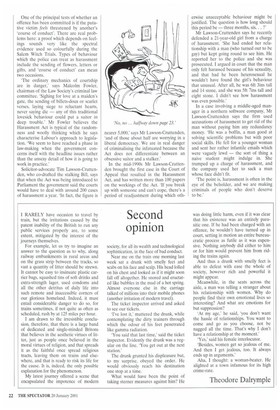Second opinion
I RARELY have occasion to travel by train, but the irritations caused by the patent inability of the British to run any public services properly are, to some extent, mitigated by the interest of the journeys themselves.
For example, let us try to imagine an answer to the question as to why, along railway embankments in rural areas and on the grass strip between the tracks, so vast a quantity of litter should be strewn. It cannot be easy to insinuate plastic carrier bags, squashed tins of soft drinks and extra-strength lager, used condoms and all the other detritus of daily life into such remote and inaccessible corners of our glorious homeland. Indeed, it must entail considerable danger to do so, for trains sometimes, if not quite as often as scheduled, rush by at 125 miles per hour.
I am drawn to the irresistible conclusion, therefore, that there is a large band of dedicated and single-minded Britons that believes in the aesthetic virtues of litter, just as people once believed in the moral virtues of religion, and that spreads it as the faithful once spread religious tracts, leaving them on trains and elsewhere, and that is ready to risk its life for the cause. It is, indeed, the only possible explanation for the phenomenon.
My latest journey offered a scene that encapsulated the impotence of modem society, for all its wealth and technological sophistication, in the face of bad conduct.
Near me on the train one morning last week sat a drunk with smelly feet and scabs on his face and scalp. His head lolled on his chest and looked as if it might soon fall off altogether. He snored and eructated like bubbles in the mud of a hot spring. Almost everyone else in the carriage talked of millions into their mobile phones (another irritation of modern travel).
The ticket inspector arrived and asked to see our tickets.
'I've lost it,' muttered the drunk, while contemplating the dirty trainers through which the odour of his feet penetrated like gamma radiation.
'You said that last time,' said the ticket inspector. Evidently the drunk was a regular on the line. 'You get out at the next station.'
The drunk grunted his displeasure but, to my surprise, obeyed the order. He would obviously reach his destination one stop at a time.
What would have been the point of taking sterner measures against him? He was doing little harm, even if it was clear that his existence was an entirely parasitic one. If he had been charged with an offence, he wouldn't have turned up in court, setting in motion an entire bureaucratic process as futile as it was expensive. Nothing anybody did either to him or for him would prevent him from riding the trains again.
And thus a drunk with smelly feet is able to defeat with ease the whole of society, however rich and powerful it might appear.
Meanwhile, in the seats across the aisle, a man was telling a stranger about his relationship with women. Why do people find their own emotional lives so interesting? And what are emotions for but suppression?
'At my age,' he said, 'you don't want the hassle of relationships. You want to come and go as you choose, not be nagged all the time. That's why I don't have a relationship at the moment.'
'Yes,' said his female interlocutor.
'Besides, women get so jealous of me. And then I get jealous, too. It always ends up in arguments.'
Aha, I thought: a woman-beater. He alighted at a town infamous for its high crime-rate.
Theodore Dalrymple






























































 Previous page
Previous page